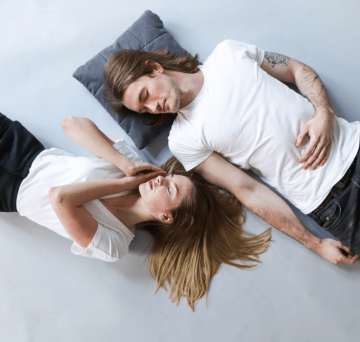Insomnia
Insomnia is a sleep disorder characterised by difficulty falling asleep, staying asleep or waking up early and not being able to get back to sleep.
If you suffer from insomnia, your sleep is not refreshing. You might experience fatigue, sleepiness and difficulty concentrating or remembering during the daytime. Irritability, depression, anxiety or accidents might join in as well.
What causes insomnia?
- Stress
- Caffeine, alcohol, smoking
- Work schedule or jet lag
- Bad sleep habits – irregular, eating heavy foods or doing heavy exercise before bed
- Blue light from the screens

What to do?
What to do when some symptoms appear?
Work on your sleep hygiene! If it doesn’t help, see your GP.
What affects sleep quality?
- Alcohol – It helps to fall asleep quickly but lowers the number of deep sleep phases.
- Caffeine – Stimulates the brain and makes it difficult to fall asleep
- Smoking – Smokers are usually light sleepers and go through less REM phases.
- High or low room temperature can disrupt REM phase because the body can’t regulate the temperature as good.
FAQ
What to do when…
If there’s someone close to you suffering from a mental illness, do not judge the or tell them to “try harder”. Give them the much needed support and understanding. They’re far from alone in this.
Who to ask?
- Close people who you trust
- General practitioner, therapist, psychologist
- Support groups, patient organisations
- Crisis centres, helplines
What are the steps to take?
- Are you in a situation that must be sorted out immediately and can’t deal with it alone? Reach out to a crisis centre.
- Are you in a situation where it’s unnecessary to sort it out immediately?
- “I CAN cover the expense.” See a therapist. They can send you to see a psychiatrist.
- “I CAN’T cover the expense.” See your GP, who’ll send you to a therapist who’s covered by the insurance company.
- “I don’t know who to choose.” Your GP will recommend you one.
When and who to ask for help?
What are the rules of sleep hygiene?
- Go to bed only when you feel tired.
- Don’t sleep during the day (a quick nap won’t hurt).
- Go to bed and wake up at the same time every day (even on the weekend).
- Sleep in a well-ventilated room. The optimal temperature is 18–20 °C and you’ll sleep the best in the dark and silence.
- Don’t drink coffee, black or green tea, coke and cocoa 4–6 hours before bed. Sensitive individuals should avoid these beverage all day (even in the morning). Caffeine is a stimulant and disrupts sleep.
- Do not smoke!
- Do not drink alcohol before bed. It relaxes you and helps with falling asleep in the short run but often makes you wake up early in the morning and tired during the day. Alcohol-induced sleep is of low quality.
- Avoid eating heavy food before bed.
- Exercise during the day. Try to use the energy but avoid heavy exercise before bed. You should be at rest at least 3 hours before sleep (but a walk after dinner wouldn’t hurt).
- Switch off your phone and computer 2–3 hours before sleep. The blue light that these devices emit lower melatonin production and make the quality of sleep worse.
- Make space for “worry time” during the day.
- Be in bed only for the purpose of sleeping (6–9 hours a night).
- If you can’t fall asleep after 30 minutes, get up and do a monotonous activity for a while (reading, listening to relaxing music, etc.).
What about the sleep phases?
Sleeping is indispensable to life. It’s a natural state opposite of being awake. Our body is at rest and regenerating. It has 2 phases – REM and non-REM – which alternate at interval of 90–120 minutes. These phases are separated by brief waking phases (movements, change of position). You’ll exceptionally remember these phases though.
1. Non-REM
The whole body is resting during this phase. The brain enjoys it the most because of its low activity (slow-waves on EEG). Your breathing, heart rate and blood pressure are regular. Your body temperature is stable and muscle tone increases which leads to body movements.
- It’s divided into 4 stages. During the first two (theta and sigma waves), the eye movement slows down, heart rate decreases and body temperature lowers. Sleep is the deepest during the third and fourth stage. If someone wakes you up during these stages – not that it’d be easy – you’ll feel desoriented.
2. REM
REM sleep is somehow deep but there’s brain activity happening which matches wakefulness. Even though the rest of the body is sleeping, your brain is awake.
There’s noticable Rapid Eye Movement, you can have vivid dreams and the heart rate and blood pressure increase.
REM phase makes up approximately 25% of our sleep.
Support online education about prevention
We want people to like prevention and make it a standard part of their lives. That’s why we create infographics, videos, articles or podcasts, which we post on Instagram, YouTube or our website. Help us educate online.
Support online education about prevention
We want people to like prevention and make it a standard part of their lives. That’s why we create infographics, videos, articles or podcasts, which we post on Instagram, YouTube or our website. Help us educate online.

